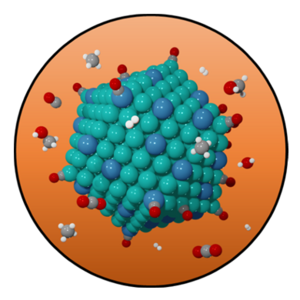
The design of a material that can catalyze the conversion of CO2 into fuels or chemicals could help us tackle climate change and our dependence on fossil fuels. This project will contribute to this goal by using theoretical methods based on machine learning to direct the search for a material that can hydrogenate CO2 to methanol at low temperatures.
In one project we are investigating single-atom alloy catalysts, which are highly dilute bimetallic alloys where one of the elements is present as single atoms dispersed in the other element. These materials have been shown to be promising catalysts for a number of reactions, since their special electronic and geometric properties in some cases allow them to escape the linear relationships (scaling relations) that otherwise typically govern adsorption energies and activation energies in catalysis. Our investigations are based on density functional theory, graph-based machine learning for the prediction of adsorption energies of the reaction intermediates and kinetic modelling.
In another project we are investigating small oxide particles on metal surfaces and in particular the catalytic sites available at the interface between the oxide and the metal. These investigations are furthermore based on global structure optimization to find stable atomic structures of various combinations of oxide particles and metal supports.
Read more about our work:
The project began in spring 2021 and is funded by a Villum Young Investigator grant.